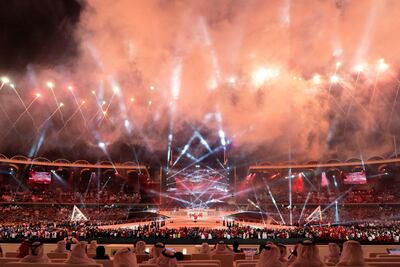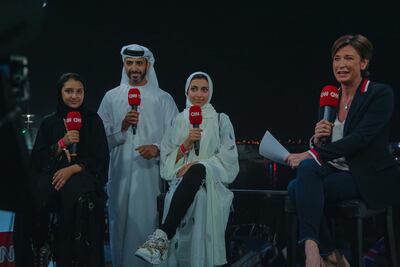The Abu Dhabi Grand Prix is traditionally a time of year when the eyes of the world are on the UAE and the Yas Marina becomes a riotous spectacle of glamour and culture.
This year was no different and I was lucky enough to have a ringside seat for the action, as we presented a special edition of Connect the World from the W Hotel, right in the heart of the celebrations as the Formula One circuit exploded into life with a stunning firework display.
But one thing occurred to me as I was welcoming a stream of guests onto our beautiful terrace set: this year, unusually, the climax of the F1 season was not the biggest international event here in the UAE. In fact, arguably, it wasn’t even the second biggest.
This was a year of almost unprecedented attention on my adopted home. The landmark visit of Pope Francis in February was an extraordinary, momentous occasion broadcast globally, with millions tuning in to see the historic event – many watching on CNN. Then, just a matter of weeks later, the Special Olympics rolled into town, with 7,500 athletes from 190 countries converging on Abu Dhabi to take part in another ground-breaking celebration.

These were events of global significance of course – both firsts in their own ways – but they also marked the culmination of quiet, steady progress of a remarkable kind here, too. The Papal visit was rightly praised for the way in which it strengthened the cultural bridge between the Christian and Muslim communities, and both sides played their part in making it a success. The UAE’s 1.2 million-strong Christian community was shown the world, alongside a Muslim majority that welcomed the Pope with moving sincerity.
The hosting of the Special Olympics was perhaps an even more marked indicator of progress. As a region, the Middle East has often lagged behind the rest of the world in recognising and catering to the needs of people of determination and providing them with opportunities. For the UAE to host an event of such scale, and for it to commit to the wider cause around it through the work of organisations such as the Zayed Higher Organisation, was to take a potentially game-changing leadership position and challenge the region to reframe its view of its most vulnerable citizens.
This year is also a special one for CNN. November marked a decade since we set up our regional hub here, and we are soon to expand our presence thanks to our partnership with TwoFour54. So much has changed in that time. A decade ago, would the idea of a Catholic Mass led by the Pope, and a global celebration of people with intellectual disabilities in the same year have seemed fanciful? I think perhaps it would; but after 2019, it feels like anything is possible.

For my own part, I was lucky enough to travel to this region many times before I came to live here six years ago. As a young traveller and holidaymaker, and then as a journalist, I thought I had a reasonably full idea of what the Middle East was about before I moved here. But I was wrong about many things.
Since setting up home here, I have been astonished by the UAE's focus on innovation, on technology, on leading-edge creative solutions to some of the greatest problems facing the world. I have also been endlessly impressed by the way women are taking leadership roles in society here, often in the most unexpected places. What better way to celebrate an F1 race than in the company of two young female Emirati racing drivers? And who, a decade ago, could have predicted such a thing?
Even in the days of global connectivity, 24-hour news coverage, wall-to-wall social media and unprecedented availability of information, the world’s image of this region remains somewhat one-dimensional. The Middle East can still often be viewed by outsiders through the prism of conflict and intolerance, of oil and extravagance.
It is important for us operating here in this region not to overlook the truths that underpin some of those prejudices, but I have been proud and delighted to play a role in bringing many of the stories that challenge these perceptions to the world.
Becky Anderson presents Connect the World on CNN International

